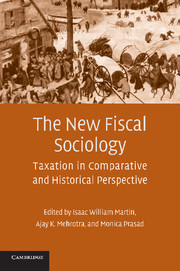Book contents
- Frontmatter
- Contents
- List of Contributors
- Acknowledgments
- Foreword
- 1 The Thunder of History: The Origins and Development of the New Fiscal Sociology
- PART ONE SOCIAL SOURCES OF TAXATION: AMERICAN TAX POLICY IN COMPARATIVE PERSPECTIVE
- 2 “The Unfair Advantage of the Few”: The New Deal Origins of “Soak the Rich” Taxation
- 3 What Americans Think of Taxes
- 4 Read Their Lips: Taxation and the Right-Wing Agenda
- 5 Making Taxes the Life of The Party
- PART TWO TAXPAYER CONSENT
- PART THREE THE SOCIAL CONSEQUENCES OF TAXATION
- References
- Index
4 - Read Their Lips: Taxation and the Right-Wing Agenda
Published online by Cambridge University Press: 13 January 2010
- Frontmatter
- Contents
- List of Contributors
- Acknowledgments
- Foreword
- 1 The Thunder of History: The Origins and Development of the New Fiscal Sociology
- PART ONE SOCIAL SOURCES OF TAXATION: AMERICAN TAX POLICY IN COMPARATIVE PERSPECTIVE
- 2 “The Unfair Advantage of the Few”: The New Deal Origins of “Soak the Rich” Taxation
- 3 What Americans Think of Taxes
- 4 Read Their Lips: Taxation and the Right-Wing Agenda
- 5 Making Taxes the Life of The Party
- PART TWO TAXPAYER CONSENT
- PART THREE THE SOCIAL CONSEQUENCES OF TAXATION
- References
- Index
Summary
The last thirty years of U.S. political and fiscal history are strange indeed when looked at in comparative perspective. National politics has been dominated by a surprising coalition between religious conservatives and economic conservatives unified by market fundamentalism – a quasi-religious faith in the capacity of self-regulating markets to solve all social and economic problems (Block 2007). This ideology strongly opposes the growth of government and sees taxation as inevitably distorting private economic decisions. This coalition has made cuts in federal taxation its highest domestic priority.
This priority diverges sharply from hundreds of years of political history in which durable ruling regimes in all parts of the world have increased the capacity of government by strengthening the state's fiscal base (Tilly 1992). Even in more recent American political history, as Joseph Thorndike shows in Chapter 2, leaders have sought to protect the state's fiscal capacity. Why have conservatives in the United States recently pursued a strategy of implementing huge tax cuts that push the federal government into deficit financing? Why has such an unusual approach to governance gained sufficient political support to keep this coalition in power for decades?
The analysis offered here is intended to complement the arguments of Andrea Campbell in Chapter 3. As Campbell's data show, there is no simple correlation between public opinion on taxation and the extent of tax-cutting effort by the administration in power.
- Type
- Chapter
- Information
- The New Fiscal SociologyTaxation in Comparative and Historical Perspective, pp. 68 - 85Publisher: Cambridge University PressPrint publication year: 2009
- 14
- Cited by



